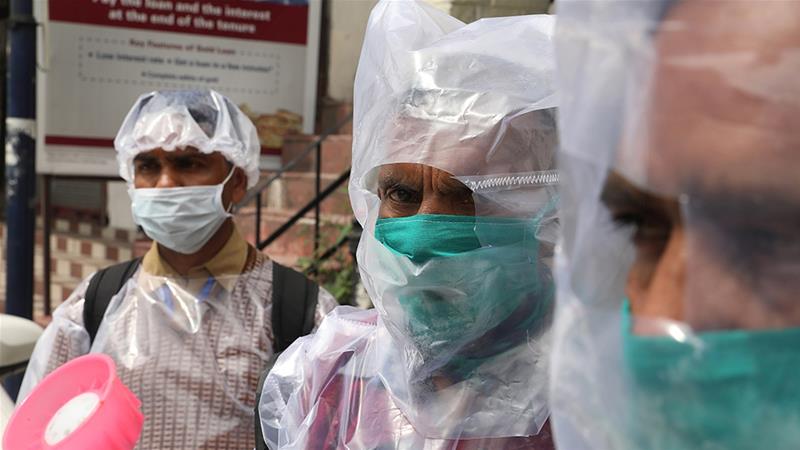The reversal of the export ban comes after Trump spoke to Indian Prime Minister Narendra Modi in a phone conversation, during which the US president said that he would be surprised if New Delhi did not relent on his request, considering India’s good relations with the US.
“I spoke to him Sunday morning, called him, and I said, ‘We’d appreciate your allowing our supply to come out.’ If he doesn’t allow it to come out, that would be okay, but of course, there may be retaliation. Why wouldn’t there be? I would be surprised if he would, you know, because India does very well with the United States,” Trump said on Monday.
India, dubbed the pharmacy of the world, banned the exports on April 4 as countries globally stockpiled the anti-malarial drug developed nearly a century ago.
Many countries, including the US, are using hydroxychloroquine as an experimental treatment for COVID-19 patients, amid a global death toll from the pandemic of more than 75,000 people.
The medicine is also used to treat other autoimmune diseases such as rheumatoid arthritis and lupus.
Trump has advocated that people infected with the coronavirus should take the medicine in consultation with doctors, and last week called the drug “a very special thing” and a “game changer”.
However, experts have cast doubt on the effectiveness of the drugs in the fight against COVID-19.
Last week, Trump urged Modi to lift the ban on the export of hydroxychloroquine and provide the US with a supply of tablets that it had previously ordered.
Read Also: COVID-19: US President, Trump Reveals Second Test Result
The number of COVID-19 cases in the US has spiked sharply in the last few days with more than 10,000 deaths. The country also has the highest number of infections in the world, with more than 360,000 cases.
India’s foreign ministry said it would lift the ban on the export of hydroxychloroquine as a gesture of solidarity.
“In view of the humanitarian aspects of the pandemic, it has been decided that India would license paracetamol and HCQ [hydroxychloroquine] in appropriate quantities to all our neighbouring countries who are dependent on our capabilities,” the foreign ministry spokesperson, Anurag Srivastava, said.
“We will also be supplying these essential drugs to some nations who have been particularly badly affected by the pandemic. We would therefore discourage any speculation in this regard or any attempts to politicise the matter,” he said in a statement.
Srivastava said there were adequate stocks of medicines in the country, which has been under lockdown since March 25 to prevent the spread of the coronavirus.
“Like any responsible government, our first obligation is to ensure that there are adequate stocks of medicines for the requirement of our own people. In order to ensure this, some temporary steps were taken to restrict exports of a number of pharmaceutical products,” he said, justifying lifting the ban.
Medical experts told Al Jazeera that the government only lifted the ban following the threats by the US president.
Washington and New Delhi are close security and trade allies with annual bilateral trade worth above $80bn.
Dr T Sundraman, of the People’s Health Movement, pointed out inconsistencies in Indian government policy on drug exports and said it was unclear whether India still had enough supplies to cover its own needs.
“We should be able to ensure that pharmaceutical companies are able to manufacture to meet these requirements, which is an important issue. Similarly, the US should not be blocking essential inputs to us which there are reports that it is doing whether it is on ventilators or different testing kits. That, too, should be made clear,” Sundraman said.
Meanwhile, India’s opposition parties accuse Modi’s government of buckling under pressure from Trump.
On Trump’s threats, Indian National Congress former leader Rahul Gandhi said: “Friendship isn’t about retaliation. India must help all nations in their hour of need but lifesaving medicines should be made available to Indians in ample quantities first,” Gandhi tweeted.
Sitaram Yechury, a leader of the Communist Party, said Trump’s statement was “unacceptable”. “… Modi govt has succumbed to the threat by allowing the export,” he tweeted.
Manish Tewari, Congress leader and a former union minister, told Al Jazeera that the India-US relationship should be viewed independently of President Trump’s histrionics.
“His threat of retaliation is a personal affront to Prime Minister Modi who had walked the extra mile and collected multitudes of people in the Ahmedabad stadium when the spectre of COVID-19 was hanging low over the world,” Tewari said.
He, however, said India’s civilisational, cultural and democratic bonds also need to be valued and that if the country could help the US or any other nation without hurting “our own interests then it can be done alone for humanitarian reasons”.
Deepak Bansal, the secretary of the Pharmaceutical Raw Material Dealers’ Association, said India’s pharmaceutical sector faced a shortage of raw materials because of the strict 21-day lockdown and that exporting hydroxychloroquine made no sense, as the country could require greater supplies within days if the situation worsened.
“We have no clarity on how much we can produce. There should be some sort of clarification on how much we have and how much we might need, and then think about exporting it. Not only have they allowed exports of hydroxychloroquine but also of several other drugs which could be detrimental for our own interests,” Bansal told Al Jazeera.
However, Vikas Bablani, owner of RPL Pharmaceuticals in New Delhi, said he was confident that India would be able to not only meet its requirements but would also be able to help those worst affected by the pandemic.
“We are the largest manufacturer of hydroxychloroquine. At present, our intensity is not as bad as compared to the US or Europe. If they don’t get it, how will they survive?” he said.
“In case there is a surge in demand, the government can then stop the export of the medicine.”
SOURCE: AL JAZEERA NEWS

